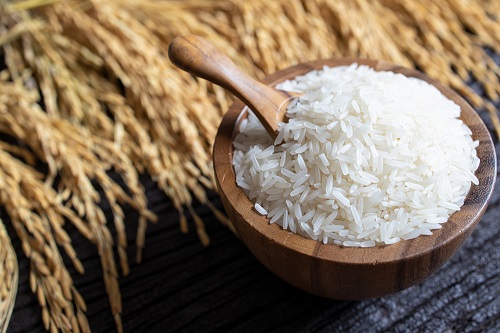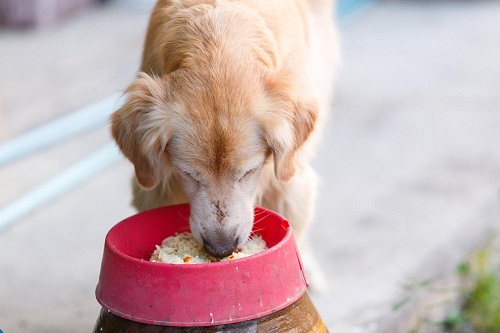Can Dogs Eat Jasmine Rice? Is Jasmine Rice Safe for Dogs? Let’s dive deep into the information to get all the right details!
You may already be aware that dogs can enjoy white rice as a treat on occasion, but what about jasmine rice? Can Dogs Eat Jasmine Rice? Is it safe for dogs? Here’s what you need to know.
What is Jasmine Rice?

Jasmine rice is a type of long-grain rice that is primarily grown in Thailand and is also produced in other parts of Southeast Asia. It is known for its distinctive floral aroma and slightly sweet flavor, which make it a popular choice for many dishes.
When cooked, jasmine rice has a soft, slightly sticky texture and a delicate, nutty flavor that complements a wide range of dishes.
Can Dogs Eat Jasmine Rice?
So, Can Dogs Eat Jasmine Rice? Yes, dogs can eat jasmine rice, as it is a safe and nutritious food for them. In fact, rice is a common ingredient in many commercial dog foods, and jasmine rice, in particular, is a good source of carbohydrates for dogs.
Is Jasmine Rice Good For Dogs?
Yes, jasmine rice can be a healthy addition to a dog’s diet. However, it should be served plain, cooked, and in moderation. Jasmine rice should not be the sole component of a dog’s diet and should be part of a balanced meal plan that includes proteins, fats, and other essential nutrients.
Health Benefits Of Jasmine Rice

Here are some health benefits of jasmine rice for dogs presented in a clear and concise manner:
- Provides energy: Jasmine rice is a good source of carbohydrates, which provide energy for your dog’s daily activities.
- Low in fat and sodium: Jasmine rice is low in fat and sodium, making it a healthier option compared to other types of food.
- Gluten-free: Jasmine rice is gluten-free, making it a great option for dogs with gluten sensitivities or allergies.
- Cholesterol-free: Jasmine rice contains no cholesterol, making it a healthy addition to your dog’s diet.
- Easy to digest: Jasmine rice is easily digestible for dogs, which can help prevent gastrointestinal issues.
Overall, incorporating jasmine rice as part of a balanced meal plan can be a healthy choice for dogs.
A Few Concerns
- Overfeeding: Overconsumption of jasmine rice can lead to an upset stomach or diarrhea due to the high carbohydrate content.
- Seasonings: Jasmine rice that is seasoned with ingredients like onions or garlic can be toxic to dogs and should be avoided.
- Allergies: While jasmine rice is generally safe for dogs, some may have allergies to rice, so it’s important to monitor your dog for any signs of an allergic reaction.
- Imbalanced diet: Feeding your dog only jasmine rice without other essential nutrients can result in an imbalanced diet, leading to nutrient deficiencies or other health issues.
- Portion control: It’s essential to monitor the portion sizes of jasmine rice you give your dog to avoid overfeeding and potential health risks.
Can Jasmine Rice Cause Diarrhea In Dogs?
Jasmine rice can cause diarrhea in dogs if it is overfed or introduced too quickly into their diet. Feeding large portions of jasmine rice can cause digestive issues, including diarrhea.
Can Puppies Eat Jasmine Rice?
Yes, puppies can safely consume jasmine rice, and it can provide them with several health benefits. The high iron content in jasmine rice can aids in developing strong muscle tissue, joints, and bones, which is crucial for their growth and development.
How to Safely Feed Jasmine Rice to Dogs?
- Introduce it gradually: Start by serving small portions of cooked, plain jasmine rice to your dog to ensure they can tolerate it.
- Serve it in moderation: Don’t overfeed jasmine rice to your dog, as large portions can cause digestive issues, including diarrhea.
- Avoid seasoning: Don’t season the rice with any ingredients that can be harmful to dogs, such as onions or garlic.
- Monitor your dog: Watch your dog for any signs of digestive upset or allergic reactions after eating jasmine rice.
- Supplement a balanced diet: Serve jasmine rice as part of a balanced diet that meets your dog’s individual nutritional needs.
By following these guidelines, you can safely feed jasmine rice to your dog and provide them with several health benefits.
Is White Rice ok For Dogs?
Yes, white rice is generally safe and healthy for dogs to eat in moderation. It can be a good option to feed dogs who have an upset stomach or digestive issues, as it is easy to digest and can help to firm up loose stools.
Can Dogs Have Cooked Jasmine Rice?

When serving jasmine rice to dogs, it’s important to serve it cooked and plain, without any added seasonings, salt, or oils. You should also introduce it gradually and monitor your dog for any signs of digestive upset or allergic reactions.
Can Dogs Eat Raw Jasmine Rice?
No, dogs should not eat raw jasmine rice or any other type of raw rice. Raw rice contains a hard outer shell that can be difficult for dogs to digest, and it may cause digestive upset or blockages in the intestines.
Cooking rice helps to break down the outer shell and makes it easier for dogs to digest. Therefore, it’s important always to serve rice cooked for dogs, including jasmine rice.
How Much Cooked Jasmine Rice Can I Give My dog?
The amount of cooked jasmine rice you can give your dog will depend on your dog’s size, activity level, and individual nutritional needs.
As a general guideline, you can feed your dog a small amount of cooked jasmine rice as part of their regular meals, usually no more than 10-20% of their daily caloric intake.
A good starting point is to feed your dog about 1/4 to 1/2 cup of cooked jasmine rice daily, divided into two meals. You can gradually increase or decrease the amount based on your dog’s response and appetite.
Rice Recipe For Dogs
- Rice and beef stew: In a slow cooker, combine cooked rice, beef stew meat, and vegetables to make rice and beef stew.
- Rice and chicken stew: In a slow cooker, combine cooked rice, chicken breast, and vegetables. Cook for 4-6 hours on low or 2-3 hours on high.
- Rice and egg: Prepare rice according to package directions. Cook an egg and add it to the cooked rice.
- Rice and salmon: Prepare the rice according to the package directions.
Quick Takeaways
Dogs can eat jasmine rice in moderation, but it should not be the primary component of their diet. Jasmine rice can provide health benefits to dogs, such as aiding digestion, promoting muscle growth, and providing energy.
However, too much jasmine rice can cause dog health issues such as diarrhea and obesity.
Homemade dog food recipes can be a great way to incorporate rice into your dog’s diet while also ensuring they receive all necessary nutrients.
Do comment below to tell us how informative the article was for you!
